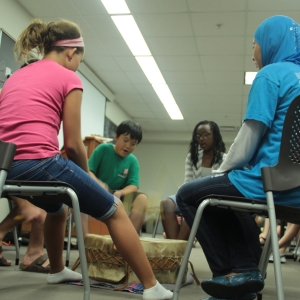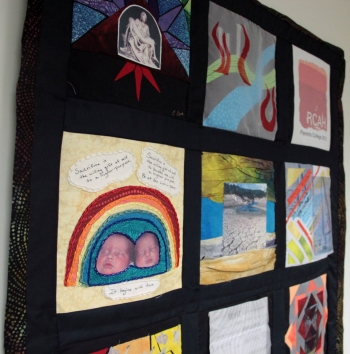Message from the Dean: Summertime
September 14, 2012
It has taken a while for the RCAH to ramp up its summer program. We've been running several popular study abroad programs and Freshman Seminar Away programs, but this summer we added three programs that I think RCAH students and others will find very attractive. Our ultimate goal is to keep the RCAH in full swing year round.
This summer we opened up our highly successful Detroit Freshman Seminar Away program led by Dave Sheridan to entering Engineering students alongside entering RCAH students. Students lived in residence halls at Wayne State University and spent time visiting and learning about some of the new entrepreneurial initiatives and renewed economic projects in the city. Throughout the fall semester, RCAH students led by Vincent Delgado and Engineering students will be sharing additional time together in civic engagement projects. These collaborative activities build on the work students and faculty from the two colleges have already done together at Peckham Industries and will focus on the development of a mobile application for an art installation at Peckham. In the future we hope to offer other cross-college and multi-disciplinary summer programs that take advantage of RCAH's extensive community partnerships and its hands-on collaborative style of teaching and learning.

In July and August we also participated in a new (for us) Sister Cities exchange program for 25 South Korean middle school students. The month-long program was co-hosted by RCAH faculty and students and our Edgewood Village Community Center partners, with daily activities held in Snyder-Phillips. John Duley and the rest of the Edgewood Village staff--including several exceptional high school-age Edgewood Scholars--provided us with an opportunity to learn firsthand the challenges of running an international and multicultural summer program for middle school students. RCAH faculty Joanna Bosse and Chris Scales worked tirelessly in the afternoons with the help of our students Ben Thorp and Elle Abeles-Allison, using music to build on the English language instruction that their South Korean students were receiving in the mornings.
Finally, we launched a new RCAH on-campus program, the Parents College. After surveying RCAH parent interest and finding that the general arts and humanities subject areas parents found most attractive were philosophy and religion, we booked rooms in Snyder-Phillips for our intrepid 'campers'. Twelve RCAH parents ultimately attended the three-day program in early August, working from 8 a.m. until 10 p.m. each day. They did the reading, listened attentively, watched closely, and chimed in with comments of their own through long and serious discussions of our topic: sacrifice. There were several variations on this theme, from the way parents sacrifice for their children, to the symbolic sacrifices that have become part of many religious rituals, to the disturbing spread of violent, messianic self-sacrifice. When asked to spend their evenings visualizing their thoughts on sacrifice through fabric art under the guidance of our guest artist, Chris Worland, they didn't miss a beat. The resulting collage of their individual creations, covering this wide range of sacrificial practices, is now on display in the RCAH with personal artist’s statements explaining why they made what they did and how they understood the logic of sacrifice. The final dinner and presentation of the fabric art projects was attended by seven RCAH students who posed questions for the presenters and thoroughly enjoyed seeing parents reliving the youthful anxieties that new students all experience in the RCAH.

While the Engineering collaboration, the Sister City exchange program and the Parents College made this an unprecedented summer for the RCAH, we were also reminded how daunting and unpredictable the challenges faced by our community partners can be. A record number of RCAH students enrolled in our Mali Study Abroad Program and were planning to join our partners at the Ciwara School just outside the capital city Bamako in June. However, in March when a complicated series of events beginning with a palace coup in Bamako occurred, we were forced to cancel the program. Since then, Mali has been struggling to restore political order, feed the many new refugees, and address some of the deeper conflicts that led to these events. While a new parliamentary government has just been formed in Mali, serious questions still remain unresolved and Malians are suffering through a very poor harvest on top of it all. At the same time, our partners at the Ciwara School actually have more students enrolled now than before the coup, in part because many other underfunded schools have been forced to close.
RCAH has designed its study abroad and study away programs in Costa Rica, Mali, Israel, Detroit, New Mexico, and West Virginia around the core value of civic engagement. We are there to help struggling communities meet their needs and learn from them. This means that our partners are often working on the margins to make a difference. When major problems occur, as they did in Mali this summer, then they can have an adverse effect on the ability of our partners, and through them, our programs. In Mali the rains come during planting season in June and July. That is also the time of the year when last year's harvest runs out, but the next harvest has not yet come in. This is not called the rainy season, but rather the hungry season. This year's hungry season has been doubly painful, and as we recalculate our return to Mali once the political troubles subside, we are also thinking of our partners and their families there whose lives have become even harder at the moment. While the events in Mali remind us of how fragile life can be in the communities we work with, they also remind us why we are there in the first place: to make a difference and to learn what making a difference means in the eyes of people whose lives can change dramatically with little warning.

